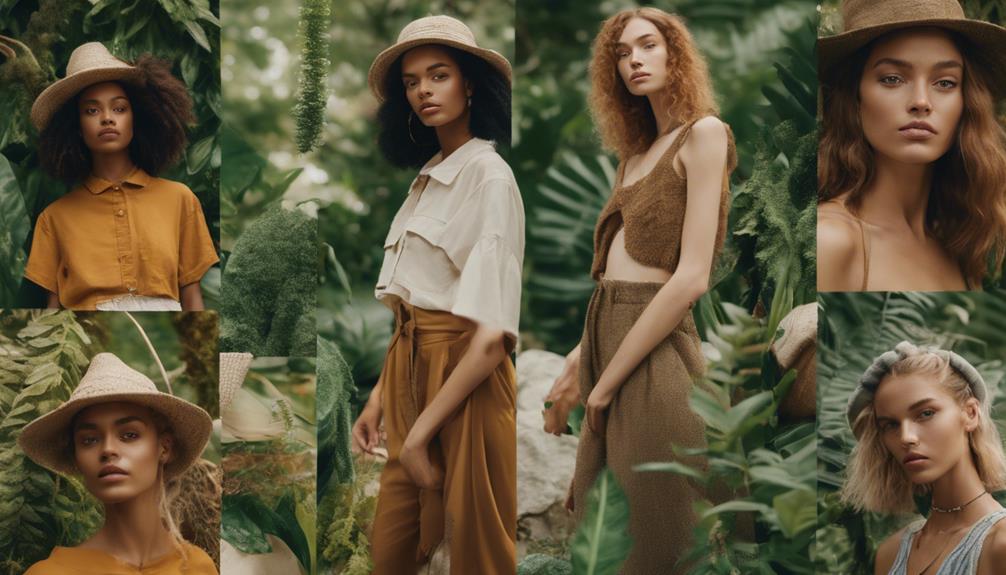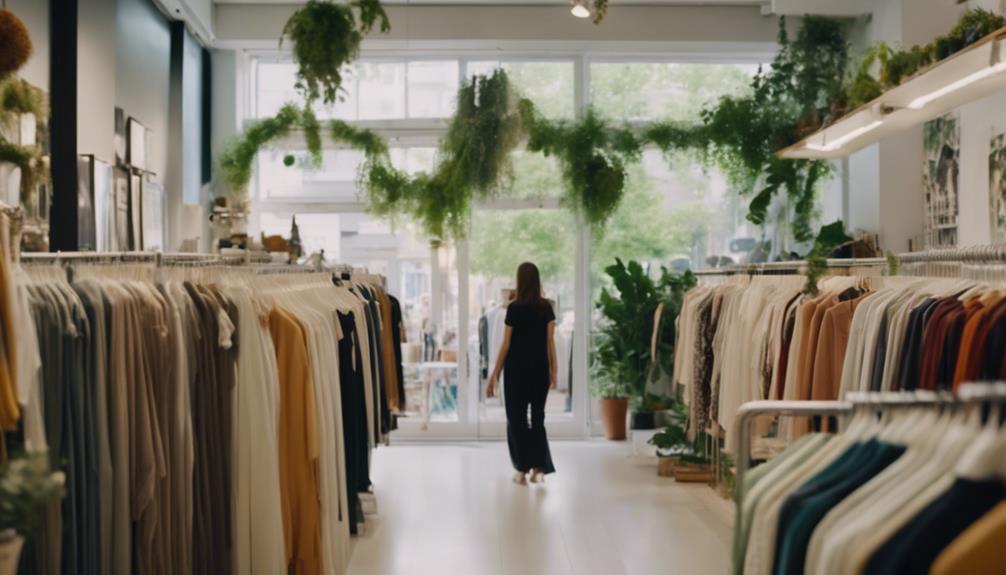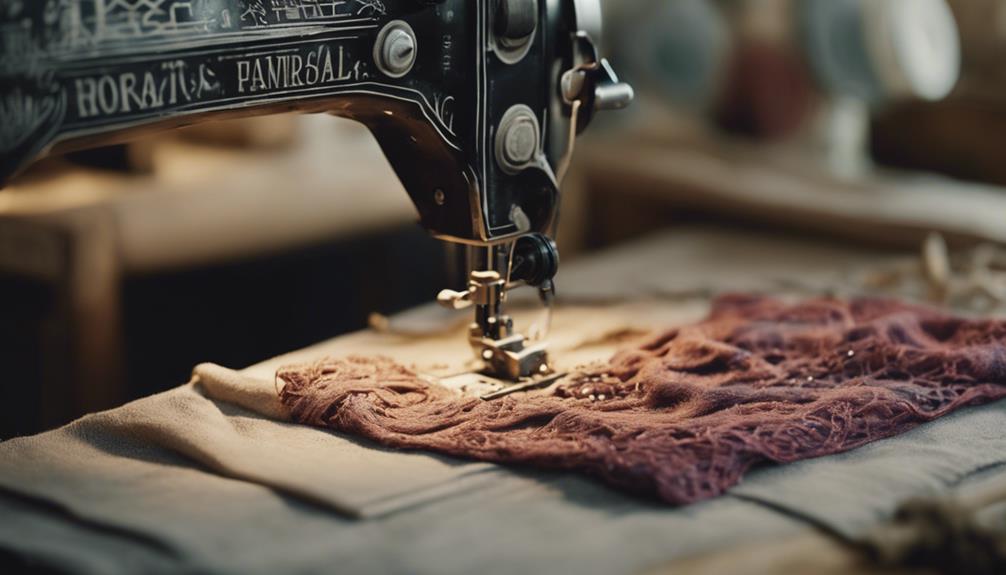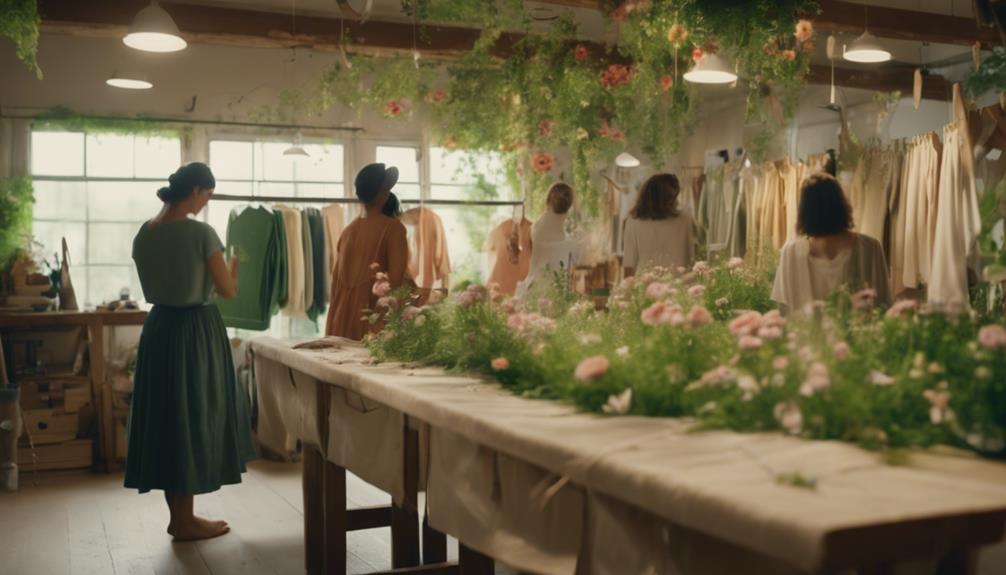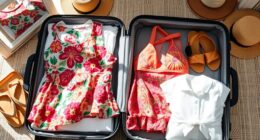You may find it surprising the variety of sustainable fashion brands available! Pact offers Fair Trade essentials, while Everlane focuses on transparent pricing. For something different, consider checking out Toad & Co, which promotes a circular fashion model. If you value ethical labor practices, Nisolo ensures fair treatment of its workers. Also, don’t overlook brands like Christy Dawn, which designs vintage-inspired pieces from leftover fabrics. With choices that prioritize size inclusivity and eco-friendly materials, shopping sustainably has never been easier. Stay tuned to discover more brands that support the environment while keeping you stylish!
Key Takeaways
- Pact offers Fair Trade Certified basics made from GOTS certified organic cotton, promoting sustainable and ethical fashion.
- Everlane emphasizes radical transparency in pricing and production while providing size-inclusive options from XS to XXL.
- People Tree produces Fair Trade certified products with a focus on organic materials and supply chain transparency.
- Yes Friends creates Fair Trade clothing using organic and recycled fabrics in solar-powered factories, supporting sustainable practices.
Budget-Friendly Sustainable Brands
When you're looking for budget-friendly sustainable brands, several options combine affordability with ethical practices and eco-conscious materials.
Pact is a great choice, offering basics made from GOTS certified organic cotton and holding Fair Trade Certified status, ensuring ethical production.
If you're after biodegradable clothing, Fair Indigo provides organic cotton options while supporting social causes through their foundation.
Everlane stands out for its radical transparency, showcasing pricing and production processes. They focus on size-inclusive offerings, catering to all body types from XS to XXL at budget-friendly prices.
Yes Friends also prioritizes affordability, with Fair Trade clothing produced in solar-powered factories, utilizing organic and recycled fabrics while remaining size-inclusive from XXS to XXL.
Boody takes a unique approach by offering budget-friendly, size-inclusive options made from OEKO-TEX® certified bamboo. Their emphasis on ethical practices and sustainability makes them a solid choice for conscious consumers.
These brands show that you don't have to sacrifice your budget or values to build a sustainable wardrobe.
With so many options available, you can easily find stylish, ethical clothing that fits both your budget and your commitment to the planet.
Innovative Sustainable Materials

Innovative sustainable materials are redefining the fashion landscape, offering eco-friendly alternatives that reduce environmental impact while enhancing style and comfort.
For instance, Econyl is made from recycled ocean plastic and waste fabric, markedly lowering the environmental footprint of traditional nylon production. Tencel, derived from sustainably sourced wood pulp, boasts biodegradable properties and is produced through a closed-loop process that recycles water and solvents.
Another exciting option is Piñatex, a vegan leather alternative crafted from pineapple leaf fibers. This sustainable solution uses agricultural waste and supports a circular economy by repurposing materials.
QMilk, made from milk protein, serves as a biodegradable textile that utilizes dairy industry by-products, contributing to circular fashion initiatives.
Lastly, S.Cafe fabric, produced from recycled coffee grounds, stands out for its moisture-wicking properties and odor control, while also promoting waste reduction in the coffee industry.
These innovative sustainable materials not only enhance your wardrobe but also align with a growing commitment to sustainability in fashion, making it easier for you to make eco-conscious choices without sacrificing style.
Ethical Labor and Practices

Ethical labor practices are essential in sustainable fashion, ensuring workers are treated fairly and paid livable wages throughout the supply chain. You'll find that many sustainable fashion brands prioritize these practices, showcasing their commitment to positive change.
For instance, People Tree is a pioneer, offering Fair Trade certified products made from organic materials and maintaining transparency in their supply chain.
Nisolo stands out by emphasizing ethical labor practices, providing fair wages to artisans while ensuring transparency in their production processes. Their focus is on sustainability and quality, making them a great choice.
Toms operates on a one-for-one giving model, ensuring that every product sold contributes to community impact initiatives, all while using sustainable materials.
Amour Vert adopts a zero-waste philosophy in their clothing production, partnering with local artisans to uphold ethical labor standards.
Similarly, Thought Clothing focuses on fair trade production methods and sustainable materials, guaranteeing that workers receive fair wages.
Vintage and Pre-Loved Options

Shopping for vintage and pre-loved options often leads to unique finds that not only express your style but also contribute to a more sustainable fashion future. By choosing these garments, you greatly reduce textile waste, as reusing one ton of textiles can save around 20,000 gallons of water and prevent 7,000 pounds of CO2 emissions.
Many brands, like Christy Dawn, focus on creating vintage-inspired clothing using deadstock fabrics, highlighting eco-friendly dye processes and ethical labor practices. Toad & Co champions a circular fashion model, offering vintage and pre-loved items while actively supporting environmental initiatives through their 1% for the Planet commitment.
When you shop vintage, you embrace unique fashion, as each piece often tells a story and stands out in a crowd. Platforms like Etsy serve as excellent marketplaces for both vintage and handmade apparel, promoting small businesses and independent creators.
This encourages sustainable consumption practices, allowing you to make conscious choices that benefit both the planet and the people behind the products. Embrace vintage and pre-loved options to not only refresh your wardrobe but also support a more eco-friendly and ethical fashion industry.
Size Inclusivity in Fashion
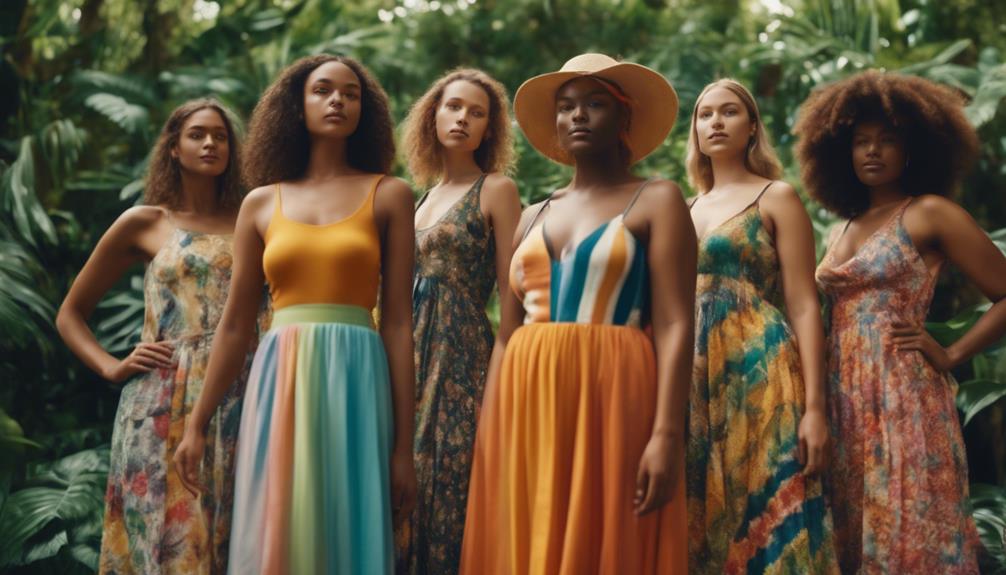
Size inclusivity in fashion is essential, as it not only promotes body diversity but also guarantees that everyone can find stylish and sustainable options that fit them well.
Brands like Warp + Weft are leading the charge, offering an impressive 75 sizes ranging from XS to 3XL (up to US 24). Similarly, Yes Friends and Sézane demonstrate their commitment to size inclusivity by providing options from XXS to XXL (up to US 14) while maintaining their focus on stylish designs.
Embracing size inclusivity is more than just a trend; it's a reflection of modern practices that enhance customer loyalty and satisfaction. Studies indicate that when brands prioritize representing body types, they foster a deeper connection with their audience.
This shift is also part of the ethical commitments many sustainable fashion brands are making today. By ensuring that their offerings cater to all body shapes, these brands position themselves as leaders in the sustainable fashion movement.
Ultimately, size inclusivity empowers individuals by allowing them to express themselves through fashion, proving that style and sustainability can go hand in hand for everyone.
Frequently Asked Questions
Who Is the Most Sustainable Fashion Brand?
Determining the most sustainable fashion brand depends on your values. You might consider Patagonia's environmental donations, Stella McCartney's innovative materials, or Eileen Fisher's circular practices. Each brand has unique strengths in sustainability you can appreciate. When looking at sustainable fashion brands in 2019, it’s important to consider the overall impact of the brand’s practices and products. Some brands may prioritize fair labor practices, while others focus on reducing waste and using eco-friendly materials. Researching and comparing the various initiatives and certifications of sustainable fashion brands 2019 can help you make an informed decision about which aligns most closely with your own values and priorities. Moreover, it’s worth examining how transparent these companies are about their supply chains and the longevity of their products. The most sustainable fashion brands often go beyond just using eco-friendly materials—they also foster innovation in production methods and offer programs for recycling or repurposing garments. By choosing to support these brands, consumers can play an active role in promoting ethical and environmentally-responsible practices within the fashion industry.
Which Luxury Brands Are Not Sustainable?
Many luxury brands aren't sustainable due to their reliance on non-eco-friendly materials, extravagant production methods, and lack of transparency. You might find brands like Gucci, Chanel, and Versace fall short in sustainable practices.
Is Zara Sustainable or Fast Fashion?
With over 92 million tons of textile waste generated annually, you'll find Zara epitomizes fast fashion. Although it offers some eco-friendly collections, its overall model prioritizes rapid production over genuine sustainability.
Is H&M Not Sustainable?
You're right to question H&M's sustainability. While they've made some efforts, their fast fashion model and high production volumes undermine true sustainability. Critics argue that their initiatives often feel more like marketing than genuine change.
Conclusion
As you explore the world of sustainable fashion, picture yourself draped in fabrics that tell stories, from budget-friendly gems to vintage treasures.
Each choice you make weaves a tapestry of ethical labor and innovative materials, creating a brighter future for our planet.
Embrace size inclusivity as you step into vibrant styles that celebrate all bodies.
In this journey, you're not just wearing clothes; you're becoming part of a movement that transforms the fashion landscape, one conscious choice at a time.
